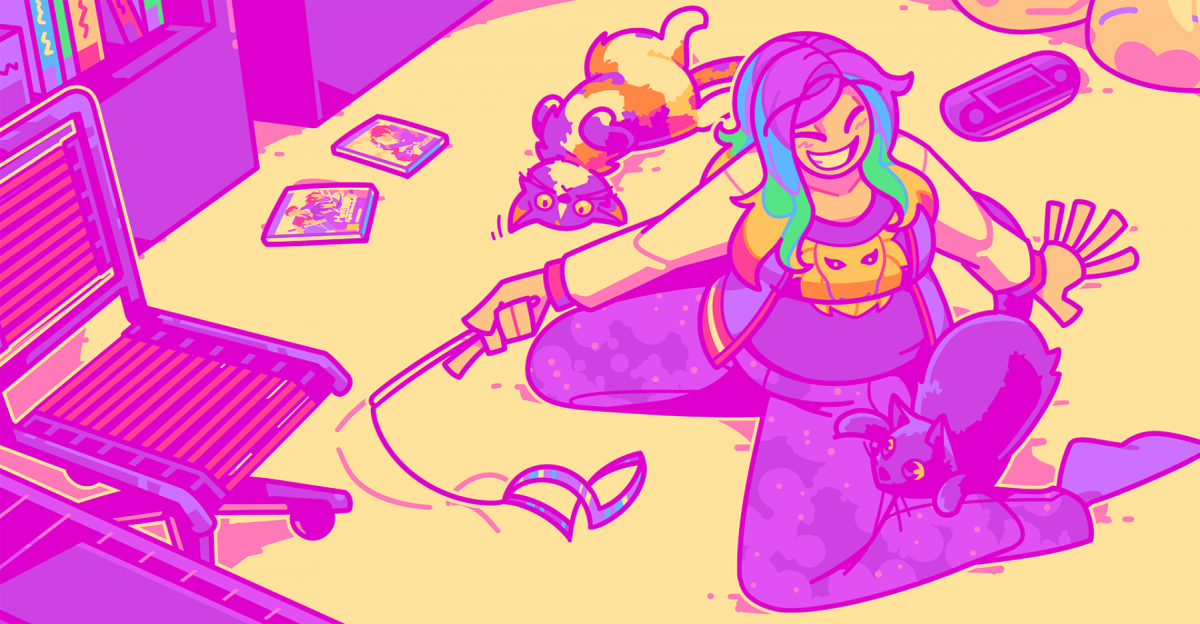
Back when Persona 5 Strikers was first announced, and it seemed to be like a “Musou style” game in the Persona series universe, I must admit, I had some mixed thoughts. The various Persona spin-off sequels have been fairly high quality, with Persona 4 Arena, Persona Q and Dancing All Night bringing fun, different twists to the Persona franchise, but I frankly couldn’t figure out how a Musou game would quite work out for the series. After spending time with the game, I’m not sure what I was expecting, but Persona 5 Strikers certainly went for something much different than a Musou battler with a flavored topping. Instead, Omega Force (Koei Tecmo’s studio), delivered a solid sequel to Persona 5 that merges action game and RPG elements into something that doesn’t always work 100%, but still provides an interesting and fun romp with fan-favorite characters once more.

Here’s a synopsis of what you can expect in Persona 5 Strikers:
Looking for some rest and relaxation, the Phantom Thieves set out to begin their road trip, until a ruthless Kyoto detective enlists their help investigating a series of strange cases occurring across Japan… otherwise, he’ll arrest Joker. As they dig deeper into the mystery, they discover another realm where innocent people are being jailed and forced to forfeit their hearts’ desires by the whims of its ruler. In typical Phantom Thieves style, they’re going to use everything they’ve got to liberate the imprisoned, return their hearts, and strike back against the corruption in their most explosive fight yet!
Persona 5 Strikers is a direct sequel to Persona 5, picking up around 6 months after the ending of the original game. A quick note to this: this game assumes that you have played Persona 5, and does not spend any time introducing, developing, or otherwise helping you understand the cast of the game. Instead, the cast exist here in their somewhat fully realized states from the end of Persona 5, meaning that their characters don’t progress much over the course of the game, and much of your enjoyment from playing this game, from a character standpoint, is going to depend on whether you know who these characters are beforehand. That isn’t to say that there’s no character development here, as Strikers adds 2 new characters to the cast: Sophia, an AI, and Hasegawa, a detective. Some other Persona 5 NPCs make appearances throughout the game, although fans expecting various characters to re-appear might be a little disappointed, as Strikers excludes or replaces some of the NPCs from the social links of the main game, mostly in terms of streamlining the overall game experience.
Strikers manages to make this work, putting most of the effort into the new dungeons, or Jails, while still giving players time to explore town areas, talk to NPCs and party members, and build on the Bond system (a sort of generalized version of the social links of the mainline games). What surprised me is that, despite some flaws in the gameplay itself, this hybrid not only works, but was an engaging and fun way to play in the Persona world, and would be a fairly interesting way to see how, or if, ATLUS and Omega Force use this system again in the future. Perhaps that’s the sign of a successful experiment: even if sometimes you burn your eyebrows off, if it works, it works!

Before we get into the nitty-gritty of Persona 5 Strikers, I have to bring up a feature I REALLY appreciated from the get-go. As you boot the game up, a system message pops up, noting that you have some data from another game in the series that unlocks some goodies for this game. What are the goodies? Why, it’s a bonus Persona 5/Persona 5 Royal soundtrack DLC! If you’re curious as how to get it when you pick up your copy of the game, worry not, here are the deets:
- PlayStation 4: If you have existing Persona 5 Royal or Persona 5 save data.
- Nintendo Switch: If you have Smash Bros. Joker DLC save data.
- Steam: Completed a playthrough of Persona 5 Strikers on Steam.
I love when something like this is integrated in a series of games I’m playing along. It’s kind of like a “Hey, thanks for playing, here’s a little something on the house.” You see something similar whenever you play any Ryu Ga Gotoku Studio games (I will never shut up about these games), and it’s a real treat to have a boost of starting items to help you early in the games. In this case, the gift is music, which is the gift that keeps on giving, if you ask me!

The first and most confusing thing about Strikers is the assumption that this would play like a Musou game, in the vein of Hyrule Warriors or Dragon Quest Heroes games, but in reality, Strikers doesn’t operate like any of those games. Dungeons are fairly small and maze-like, with platforming and various puzzle segments to solve while traversing them, and enemies patrol set paths that, when engaged, turn into isolated battles against groups of enemies. If you’ve played various Musou games in the past, you might actually find yourself disappointed when you open your copy of Strikers, as you won’t be piloting Joker or other Phantom Thief members across sprawling maps and hordes of enemies. Enemies don’t respawn unless you leave the Jails entirely, which also means that you’ll need to consider how, or if, you want to grind your party and Personas. I think the thing that surprised me the most, gameplay wise, was how much of a dungeon crawler Strikers turned out to be, rather than a combo based action game. While skill in combat mattered, I found myself frankly losing combat earlier more often than I expected by just trying to combo my way out of battles instead of playing more like an RPG: switching party members to various skills, using Persona abilities, watching out for weaknesses, and taking advantage of All Out Attacks are paramount to success in Strikers. Once I got into the mindset of viewing the game as an RPG with real time action combat, things went much smoother and I found myself really enjoying the experiments the game was trying out.
Rather than playing as a single character, you’ll instead take a party along with you into the Jails that you can swap at the beginning of the dungeon, and then any time through the menu system (other than in combat). Each character has a specific playstyle, but none of them were overly complex or unique in a way that felt totally different from other characters. This, perhaps, was one of the more unfortunate parts of the mash-up here to get the axe; where Musou games would sometimes take interesting twists on how a character “might” play in combat, the characters in Strikers all use the same toolkits, with the biggest differences boiling down to their Personas, and some slight combat modifiers or twists. The trade-off here is that you have 4 characters you can instantly swap between with the Baton Pass system, meaning you’re able to quickly go back and forth between your active party for their abilities and techniques, as well as charging the Show Time meter (a mostly one hit instant kill).

I will say that the 4 characters + enemies made battles occasionally chaotic to follow, as your party member’s Personas popping in and out of combat would occasionally obscure enemies you’re fighting, or even make you suddenly afraid that some huge, scary new enemy has appeared in the battle. To say that it can be easy to lose track of what is happening in combat here is an overstatement, as there were times when I just did what I felt would work, and had to live with the outcome later. Difficulty can be quite intense as well, especially if you play on Hard, but even Normal might catch you off guard if you’re unprepared for what the game is going to throw at you (or if you make the mistake of having Personas that are weak against what current enemies are using against you!). Still, the combat is fast and furious, and often makes you feel really powerful as you start chaining together combos, Persona spells, All Out Attacks, and more together to decimate your foes.
You can also take advantage of the platforming action system the game uses for dungeon exploration, allowing you to sneak up on and ambush enemies (or, if you’re careless, getting ambushed yourself). These platforming features sometimes carry over into the actual battles, adding AOE attacks that aren’t normally available to your characters. From the standpoint of level design, I really enjoyed this aspect of the game, as it made various features of the maps feel important and thought out, but then also made the stages interactive beyond simply traversing them to get from point A to B. There are even parts where your characters can leap from action point to action point, giving the game a cool physical flair that matches the stealthy but flashy attitude of the Phantom Thieves.

This style carries into various aspects of the game. The menu system is gorgeous, and I loved just looking at the little features the game built into things like its shop menu, or the mission start screens in your hideout and in dungeons. The Show Time attacks and All Out Attacks look amazing, and it’s very clear the team wanted you to feel the visual aesthetics of the game in every possible place they could work them in. Persona 5 was already fairly flashy, but Strikers really takes things to the next level at times, and helps bring the game to life with the somewhat limited gameplay options compared to the original. The music, too, features much of the Persona flair that fans are likely to expect, and includes various remixes to Persona 5 themes, as well as some original music.
Perhaps, again, the only downside to this is that Strikers won’t appeal to new fans. This game is strictly for Persona 5 fans who have played the original, and much of the aesthetic bonuses and character interactions feel like they’re based off of knowing the base game inside and out. This, perhaps, is the biggest overall misstep in Strikers, as it makes the game a hard sell to anyone who didn’t like, or didn’t finish, Persona 5. While that might seem obvious, comparing it to Hyrule Warriors or Dragon Quest Heroes helps make the issue a bit more clear. You could still be a Zelda or Dragon Quest fan without having played the very latest iteration of the series and enjoy the Musou options, but Persona 5 Strikers makes it very difficult to get the full level of enjoyment out of the game without already having known Persona 5’s story and who the characters are. Admittedly, this game is not trying to reinvent the wheel in terms of narrative depth, and shares this problem with Persona 4 Dancing All Night, but it is still kind of a big issue in getting new people into the game.

There are some other minor issues with Strikers. I played it on the Switch, so perhaps this isn’t an issue in other versions, but I found the load times were occasionally much longer than I was expecting, particularly into and out of the Velvet Room, or when the game loaded new areas in the Jails. Other issues I had were related to the controls and exploration of the various areas of the game. I often found that Joker’s movement during exploration (both in town and Jails) was a little jerky and not smooth. There were times when prompts for dialogue or combat ambushes would not trigger from one angle, but would from another, and a few times I found that the NPC I needed to talk to in order to progress my investigations would just blend into the background too easily, as the prompt would only appear from a very specific angle at times. None of these issues are game breaking, but they were common enough that the somewhat janky controls did feel a bit frustrating, considering a lot of polish in other areas of the game.
As far as other common Switch complaints, I’ll admit that I never really saw any particular issues between playing the game docked or handheld, and frankly was surprised that the framerate never fell out of the game when playing in docked mode. I’m not particularly sure how the team avoided it, but the only actual Switch related negative I had was the load times, which aren’t really a big deal in the long run; I’ll gladly wait 5 more seconds for something to load than deal with the framerate turning my game into a slideshow any day!

As I played more of Strikers, I found myself enjoying the game a lot, but also finding it harder to place the game into any particular category. Musou fans looking for the Persona Musou game that was first hinted at will likely not find that experience here, and newer players who have never played Persona 5 will likely bounce off of the character interactions that rely on you already knowing much of the characters themselves to enjoy how and why characters are doing things, and a narrative that overall lacks the character growth and depth that the Persona games rely on. But what I did find was a fun, charming romp through the Persona 5 world with a new spin on things, revisiting characters that I enjoyed the first time around but getting to play them in a new way, from a slightly different perspective. The lack of deep social management is replaced by action dungeon crawls, but it also made Strikers really easy to play on the go, getting a few runs at a dungeon and leveling my characters at any time of the day, in any place I wanted. The game is also fairly long considering how pared down everything is, which really helped sell the game system and get me invested.
So, on to the big question: Should you pick up Persona 5 Strikers? I think that fans of Persona 5 should absolutely consider grabbing it, as this game kinda feels like it’s a direct sequel OVA, or the movie after your favorite anime series ends that lets you visit your beloved characters one more time. The action-oriented gameplay isn’t overly complex, and players of almost any skill level can find plenty to enjoy here. I found the Easy difficulty was a great introduction for people who just wanted to see the story, while still having some challenge, while the Hard difficulty really did make me sweat quite a few times! The few issues with polish that I had are not enough to discourage people from picking up the game either, so if you’re going through Persona withdrawals or just want a new action RPG to play (and you loved Persona 5) then Strikers is definitely the game for you. If none of that appeals to you, while I appreciate you reading all the way here, you may want to look elsewhere. And that isn’t even meant as a swipe at Strikers; trust me: if you didn’t like Persona 5, you won’t like Strikers, and if you haven’t played Persona 5, go do that instead, especially with Persona 5 Royal available!

If you want the latest on what ATLUS is up to, don’t forget to follow them on Twitter, Facebook, Instagram and YouTube!
Until next time! ✨
Will you be joining the Phantom Thieves on their new adventure? Let me know what your thoughts down in the comments below!





























